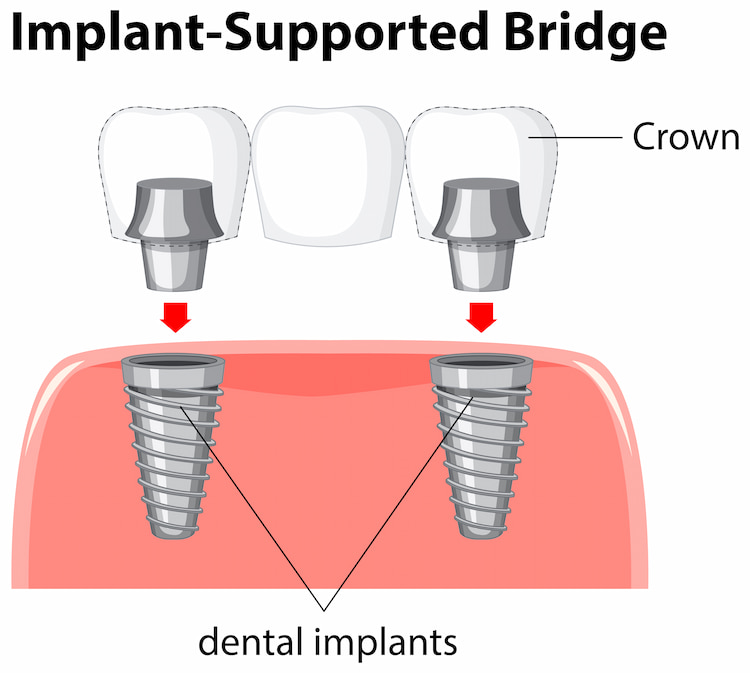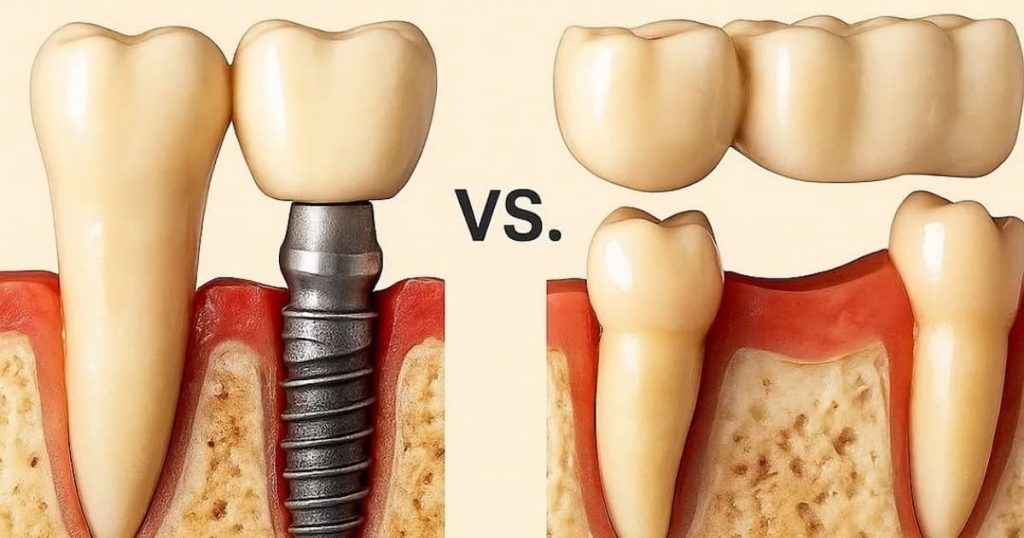Missing teeth can affect your smile, the way you chew, the way you speak, and even the way your face looks. For many people, deciding between dental implants and dental bridges becomes one of the most important choices in their oral health journey. Both options restore function and appearance, but they differ in procedure, longevity, cost, and maintenance.
In this blog, we’ll explain everything you should know about dental implants vs bridges, what implants and bridges are, compare their pros and cons, look at treatment timelines and maintenance, and help you understand which option may suit you best.
What Are Dental Implants?
A dental implant is a titanium post surgically inserted into the jawbone. Over time, it fuses with the bone in a process called osseointegration. This secure bond makes the implant function much like a natural tooth root. Once the implant is stable, an abutment is attached, which serves as a connector for the visible crown. The crown is custom-made to blend seamlessly with your natural teeth in shape, size, and color.
This entire process not only replaces the missing tooth but also stimulates the bone, preventing the jawbone from shrinking over time, a common problem when teeth are lost.
Get a deeper understanding of this popular treatment in our guide: What You Need to Know About Dental Implants

What Are Dental Bridges?
A dental bridge consists of one or more artificial teeth (called pontics) that are held in place by abutment teeth on either side of the gap. These abutment teeth are usually covered with crowns to anchor the bridge securely.
Unlike implants, bridges don’t require surgery, and they can be placed relatively quickly. However, they do require the reshaping of healthy teeth, which some patients find less desirable. There are several dental bridge types available:
- Traditional bridge: The most common type, supported by crowns on both sides of the gap.
- Cantilever bridge: Anchored by only one supporting tooth.
- Maryland bridge: Uses a metal or porcelain framework bonded to the back of neighboring teeth.
- Implant-supported bridge: Instead of relying on natural teeth, this bridge attaches to dental implants for added strength.

Key Differences Between Dental Implants and Bridges
Deciding between an implant and a bridge often comes down to three major concerns: cost, treatment time, and long-term maintenance. Below, we’ll explain how these factors are different for implants and bridges.
Upfront Cost vs Long-Term Cost
Many patients ask: “Are dental implants more expensive?” The short answer is yes, implants generally cost more upfront. However, because implants can last a lifetime, they may be more cost-effective in the long run. Bridges, while cheaper initially, may need replacement after 10-15 years, leading to additional expenses.
Treatment Timeline
The implant treatment timeline is longer. After surgery, the jawbone needs several months to heal and integrate with the implant before the crown can be placed. This healing period is often called the implant healing time. In contrast, bridges can typically be completed in just a few weeks.
Maintenance
Maintenance of dental bridges vs implants is another deciding factor. Implants are brushed and flossed just like natural teeth. Bridges, however, require special cleaning under the pontic and between the crowns, which some patients find more difficult. Improper cleaning can lead to decay in abutment teeth or gum disease.
Let’s learn more about the consequences of not treating your missing teeth: Complications Caused by Tooth Loss
Implants vs. Bridges: Pros & Cons Comparison
Both options have unique benefits and drawbacks. Understanding them will help you make an informed decision. Let’s explore the advantages and disadvantages of each treatment.
Pros of Implants
- Long-lasting (often 20+ years or even a lifetime).
- Prevent bone loss by stimulating the jaw.
- Do not affect neighboring teeth.
- Natural appearance and feel.
- Strong biting and chewing function.
Cons of Implants
- Higher upfront cost.
- Requires surgery and healing time.
- Not suitable for everyone (e.g., low bone density, certain health conditions).
- Longer treatment timeline.
Read more: Advantages of Dental Implants
Pros of Bridges
- Faster and less invasive.
- More affordable upfront compared to implants.
- Suitable for patients who cannot undergo surgery.
- Reliable function and aesthetics.
Cons of Bridges
- Shorter lifespan (typically 7–15 years).
- Requires reshaping healthy teeth.
- Increased risk of decay or damage to abutment teeth.
- Does not prevent bone loss in the jaw.

Which One Should You Choose?
Choosing between implants and bridges isn’t just about cost. It depends on your health, lifestyle, and dental needs.
Considering Health, Bone & Age Criteria
Eligibility for dental implant placement depends on having good bone density. Patients with significant bone loss may need a bone graft. Age isn’t usually a limitation, but overall health conditions, such as uncontrolled diabetes or smoking, can reduce implant success.
Considering the Number and Location of Missing Teeth
For a single missing tooth, an implant is usually the best option. For multiple missing teeth in one row, a bridge (especially an implant-supported one) might make more sense.
Considering Personal Preferences & Lifestyle
If you want a faster, less invasive solution, a bridge may be better. If you prefer a longer-lasting, natural-looking solution and are willing to invest time and money, implants are worth considering.
Contact Us and Get Professional Help
Thinking about restoring your smile? Book a consultation at Empress Walk Dental today. Our team will help you decide whether a bridge or an implant is the right solution for you.
Alternatives and Hybrid Options
If neither a bridge nor an implant seems right for you, there are other choices.
- Partial Dentures: Removable appliances that replace multiple missing teeth. They are affordable but less stable than fixed options.
- Implant-Supported Bridges: A hybrid solution that combines the stability of implants with the efficiency of a bridge. This option is ideal for patients missing several teeth in a row.
- Other Emerging Technologies: Advances such as mini-implants and digital dentistry are opening up new solutions that may provide faster healing and better aesthetics.
Implants vs Bridges: Let Us Help You Choose Wisely
Both dental implants and dental bridges are excellent solutions for replacing missing teeth, but the right choice depends on your unique situation. Implants offer unmatched durability and bone preservation, while bridges provide a faster and more budget-friendly alternative. The best way to decide is to consult your dentist, who can assess your oral health, lifestyle, and long-term goals.
Ready to restore your smile? Contact Empress Walk Dental today to schedule a personalized consultation. We’ll help you find the best option for your needs.
FAQ
-
How long does a dental bridge last compared to an implant?
A dental bridge typically lasts 10 to 15 years, while implants can last 20 years or longer with proper care.
-
Is implant placement painful?
Implant surgery is done under anesthesia, so patients feel little to no pain during the procedure. Mild discomfort afterward can usually be managed with medication.
-
Will a bridge damage the adjacent teeth?
Yes, traditional bridges require reshaping the abutment teeth, which may make them more vulnerable to decay or damage over time.
-
Can I get an implant if I have low bone density or medical issues?
Yes, but you may need a bone graft first. Your dentist will evaluate your bone density and overall health to see if you are a candidate.
-
What is the cost difference and will insurance cover implants vs bridges?
Bridges are less expensive upfront, while implants cost more but may be cheaper long-term. Some insurance plans cover bridges but only partially cover implants.
-
What is better for a missing single tooth: implant or bridge?
An implant is usually the preferred option because it doesn’t affect neighboring teeth and lasts longer.
What do you think? Would you prefer the durability of implants or the simplicity of bridges? Share your thoughts in the comments below!






